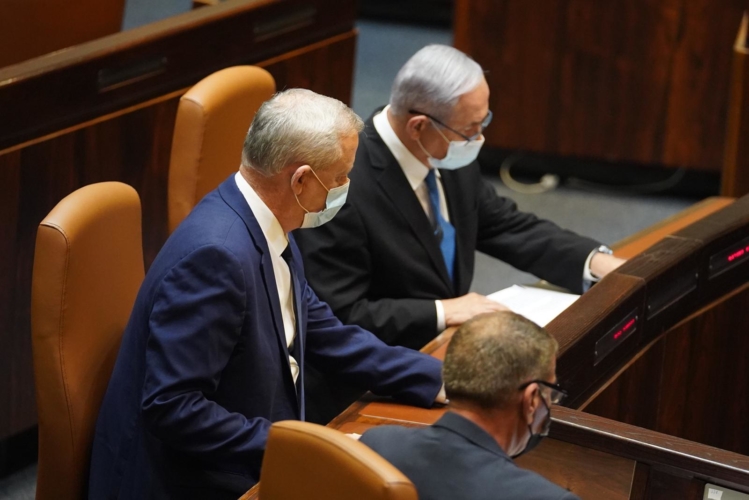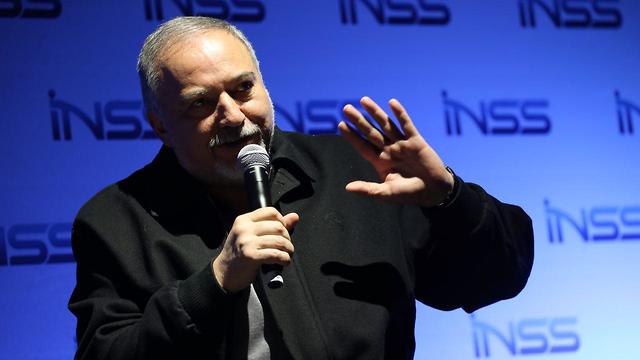Here we go again! Israel votes today for the fourth time in less than two years. And this time its during the Covid-19 pandemic. There were three elections held in the eleven months between April 2019 and March 2020. But no one party was able to get a majority 61 seats to form a government. Then a coalition was formed in 2020 because of the Covid Crisis. But everyone sees today as a continuation of the same elections which began in 2019.
How did this happen? How did we get here? Well this can all be placed on the shoulders of Yvette Lieberman, head of the Yisrael Beitenu Party. He refused to sit in any government led by Binyamin Netanyahu. But why? Lieberman got his start 25 years ago as Netanyahu’s chief of staff when he was prime minister the first time. Then Lieberman formed his own party and joined the Knesset for the first time in 1999. Since then he sat in every government led by Netanyahu, except for the last one.
Will you offer us a hand? Every gift, regardless of size, fuels our future.
Your critical contribution enables us to maintain our independence from shareholders or wealthy owners, allowing us to keep up reporting without bias. It means we can continue to make Jewish Business News available to everyone.
You can support us for as little as $1 via PayPal at office@jewishbusinessnews.com.
Thank you.
So why have these last four elections been different from all of the ones which came before?
Lieberman resents Netanyahu because of what happened in 2015. In 2013 his party ran on a joint list with the Likud Party. Yisrael Beitenu greatly benefited from this. But then in 2015 the two parties separated again and Netanyahu campaigned for Lieberman’s voters’ support. It was a close election and he rightly called on more people to vote Likud so that his party would get the most seats. It turned out to be a tight race with the Labor Party. It worked and Netanyahu was able to form a government with just 61 seats and without Yisrael Beitenu.
Lieberman at first refused to sit with the Haredi parties and continued to whine about Netanyahu “stealing” his voters. This sort of “cry baby” behavior is typical among Israel’s senior politicians. Eventually, however, Netanyahu offered Lieberman the position of Defense Minister and he did join the government. But now Lieberman says never again.
But the most important difference over 2015 is that Binyamin Netanyahu has been formally indicted on charges related to corruption. The specifics are not important here. What is important to know is that the indictment gave Netanyahu opponents a casus belli, so to speak. Their main campaign cry of the last two years has been that Binyamin Netanyahu is corrupt and that he must go. Regardless of one’s politic, they say that once indicted Netanyahu should have stepped aside; even though, Israel’s Supreme Court ruled that a Prime Minister need not resign when under indictment, whereas a simple cabinet minister must do so.
What else has changed? For some reason Israel’s Left has fallen. In 1992 the Meretz and Labor parties won a combined 56 seats. In 2020 they ran on a joint list and won just 7 seats. And this did not happen merely because seats went to the Arab parties. In 1992 the two parties and the Arab parties combined had 62 seats. In 2020 they had just 22 between them. Where did those 40 seats go?
The votes went to more centrist parties which do not make the peace process a central part of their campaigns. There is the secular Yesh Atid Party which is now polling at 19 seats. Then there is the former Likud minister Gideon Saar’s new party called New Hope which is polling at about 8 seats. The two leaders promise not to sit in a Netanyahu led government.
This could make the new kingmaker in Israeli politics Naftali Bennet, the leader of the right wing/religious coalition party Yamina. The party’s name literally means “To the Right.” Netanyahu cannot form a government without Yamina. Depending on the accuracy of the polls he might have a majority with it, or just miss passing the 61 seat threshold.
Naftali Bennet is not ruling out sitting in a centrist government without the Likud. The problem here is that any such government would need to have the ultra-orthodox parties sit together with the secularist Yesh Atid and Yisrael Beitenu. It would also need the right wing Yamina and Yisrael Beitenu parties to agree to sit with the Labor Party or even the Joint Arab List. This is highly unlikely.
Also, who would be the new prime minister? Yair Lapid stands to lead what would be its largest party should they succeed in putting together such a coalition. But neither Gideon Saar nor Naftali Bennet wants to see Lapid be the prime minister. Each says that he would lead a new government. Last time Benny Gantz was the clear leader of the Center/Anti-Netanyahu block and Lapid joined with Gantz’s Blue and White Party.
But this time there is no such clear leader. As of the opening of the polls this morning Israelis are looking at the strong possibility of yet another deadlock.
A minimum of 3.25% of the vote is needed to get into the Knesset. A party which gets even just one vote less than this will see its votes discounted. Representation in the Knesset is proportional. So if a party gets 10% of the vote it get 12 Knesset seats. But once all of the votes for parties which failed to pass the threshold are discounted, that 10% goes up. That party could then have 11% of the vote and so get 13 seats instead of 12.
If one part gets 3% of the vote it won’t get into the Knesset. But if its voters had all voted for a larger party with a similar platform then that party would have gotten at least 3 more seats. This fact stands to be the decisive factor in 2021.
Everything this year depends on how many votes go to parties which fail to get into the Knesset. As of now, more such votes seem to be committed to ant-Netanyahu parties. So everything hinges on three parties: Blue and White, Meretz and Ra’am.
Blue and White was the new big party in Israel two years ago. Led by the former IDF Chief of Staff Benny Gantz, it tied the Likud Party with 35 seats in the first round of elections held in April 2019. But two years is a really long time in Israeli politics. Back then Blue and White was an amalgam of three parties and included the secular Yesh Atid party and the smaller Telem party. Yesh Atid’s leader Yair Lapid really does not like Netanyahu after his brief stint as a member of Netanyahu’s short government from 2013-2015. He has stood against Binyamin Netanyahu ever since.
The third party in the coalition, Telem, was led by former IDF Chief of Staff and former Defense Minister Moshe Ya’alon. Ya’alon was once a Likud member and served under Binyamin Netanyahu. But he was fired from his job as defense minister mid-term and never forgave Netanyahu for how he was treated. He hated Netanyahu so much that Ya’alon agreed to serve under his former subordinate Gantz. Benny Gantz served under Ya’alon’s command both as a general and later when Ya’lon was minister of defense.
What brought these three parties together the last time was one thing: they all hated Netanyahu. But in three different elections in just one year they were unable to unseat him as prime minister. And because he was the prime minister, under Israeli law Binyamin Netanyahu continued to serve in that capacity for a year until the current coalition was formed.
Then came the Coronavirus. The third of Israel’s elections took place just before the first Covid lockdown in the country. So Gantz blinked. He broke with his partners Ya’alon and Lapid and agreed to join Binyamin Netanyahu in a new coalition government. Benny Gantz told his supporters that his decision to do so was based on the Covid crisis, that he could not put Israel through another snap election in such a time of crisis.
However, he did ensure himself the position of Minister of Defense in the new government. He also acquired for his partner and former commander, fellow former IDF Chief of Staff Gabi Ashkenazi, the position of Minister of Foreign Affairs. Most importantly, for Gantz, he became the co-premiere together with Netanyahu. Under the coalition agreement Netanyahu would be the Prime Minister for two years and then turn it over to Gantz for the next two. This, it was explained, was somehow different than in the past when they had a rotation of the premiership in a national unity government.
But Gantz could only bring with him about half of his party’s members. Most observers were shocked that he trusted Netanyahu to keep his word. Gantz had his people voted in favor of a number of new laws which favored Netanyahu personally. This included a tax break for a serving Prime Minister which gave Netanyahu a retroactive tax refund.
This time both Generals Ya’alon and Ashkenazi have quit politics. Yesh Atid is running separately and is back up in the polls to its 2013 high of 19 seats in the Knesset. And Benny Gantz’s Blue and White is barely holding on. He refused calls to simply drop out. If his party fails to cross the minimum threshold while gaining thousands of votes it will only help Netanyahu.
The same is true for Ra’am. This Arab party previously ran with the Joint List. This list was formed in 2019 by the three Arab parties in Israel because the minimum threshold for reaching the Knesset was raised. Now Ra’am is running separately and if it fails to pass the 3.25% threshold by a small margin it will seriously harm the left in Israel and probably get Netanyahu re-elected. The Joint List now has 15 seats. It could get just 12 seats this time and Ra’am may fail to get any.
The left-wing Meretz party was formed in 1992 as a coalition of three smaller parties. That year it won its high of 12 seats in the Knesset. Last time it ran in a joint list with Israel’s Labor Party. Now it’s independent again and is on the bubble hoping for the minimum of four seats. If it fails to get in then it will be another boost to Netanyahu.
The sad thing about Meretz is found in its campaign this year. The party is begging former supporters not to abandon it. Signs on the sides of buses remind them that the party is in danger of disappearing. Its slogan is simply “Israel needs Meretz.” But no reason why is given. And how did Meretz fall so far?
Well it failed to offer any real platform other than secularism and has failed to deliver on anything tangible. It also went back on its promises in the past not to sit in governments with the ultra-orthodox and agreed to support continuing military deferments for yeshiva students. It rationalized these actions as necessary for continuing the peace process.
The Labor Party is polling at round 7 seats. Should Meretz fail to get in then its voters could have given three more seats to Labor, greatly strengthening the anti-Netanyahu block.
If just one of these three parties fails to make it past the 3.25% minimum threshold it will be a boon to Netanyahu’s chances of forming a government. If two fail, he will likely win outright. Most people will agree that if none of the three pass the threshold then their combined lost votes from the Left/anti-Netanyahu camp will ensure Likud and Netanyahu a new four year government.
It is a sad statement that for the last two years Israeli elections have been about just one man and not the major issues that concern the country. If you oppose Binyamin Netanyahu then you put the blame on him. His detractors say that he should have stepped aside and had he done so Likud might have won in one of the previous elections.
Netanyahu supporters say that the center-left has simply failed to give Israelis a positive reason to vote for them. They say that Netanyahu has not lost any real public support and that the other side has made the elections personal.
In 11 hours we will hear the first results. The exit polls will give us an idea of who, if anyone won the election. But if its as close as the last three times then we will probably need to wait until tomorrow morning to get the final results.







